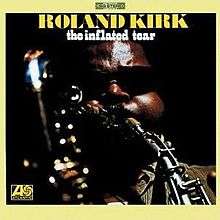The Inflated Tear
| The Inflated Tear | ||||
|---|---|---|---|---|
 | ||||
| Studio album by Roland Kirk | ||||
| Released | June 14, 1968 | |||
| Recorded | November 27–30, 1967 | |||
| Genre | Jazz | |||
| Length | 37:43 | |||
| Label | Atlantic | |||
| Producer | Joel Dorn | |||
| Roland Kirk chronology | ||||
| ||||
| Professional ratings | |
|---|---|
| Review scores | |
| Source | Rating |
| Allmusic | |
The Inflated Tear is an album by Roland Kirk released in 1968. One of his most popular albums and sometimes regarded as his magnum opus, it established his reputation as a jazz composer and earned him a modicum of respect in music circles who had previously written him off as a sideshow.
It was re-released in 1998 by Rhino featuring a bonus track and extensive liner notes.
Track listing
- All songs written by Roland Kirk, except where noted
- "The Black and Crazy Blues – 6:07
- "A Laugh for Rory" – 2:54
- "Many Blessings" – 4:45
- "Fingers in the Wind" – 4:18
- "The Inflated Tear" – 4:58
- "Creole Love Call" (Duke Ellington) – 3:53
- "A Handful of Fives" – 2:42
- "Fly by Night" – 4:19
- "Lovellevelliloqui" – 4:17
- CD bonus track
- "I'm Glad There Is You" (Jimmy Dorsey/Paul Mertz) – 2:12
Personnel
- Roland Kirk – tenor saxophone, manzello, stritch, clarinet, flute, whistle, cor anglais, flexatone
- Ron Burton – piano
- Steve Novosel – bass
- Jimmy Hopps – drums
- Dick Griffin (credited as Dick Griffith) – trombone
This article is issued from Wikipedia - version of the 5/11/2016. The text is available under the Creative Commons Attribution/Share Alike but additional terms may apply for the media files.